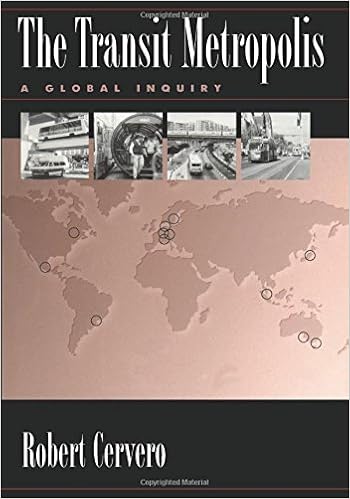
Free Downloads The Transit Metropolis: A Global Inquiry

Around the world, mass transit is struggling to compete with the private automobile, and in many places, its market share is rapidly eroding. Yet a number of metropolitan areas have in recent decades managed to mount cost-effective and resource-conserving transit services that provide respectable alternatives to car travel. What sets these places apart? In this book, noted transportation expert Robert Cervero provides an on-the-ground look at more than a dozen mass transit success stories, introducing the concept of the "transit metropolis"—a region where a workable fit exists between transit services and urban form. The author has spent more than three years studying cities around the world, and he makes a compelling case that metropolitan areas of any size and with any growth pattern—from highly compact to widely dispersed—can develop successful mass transit systems. Following an introductory chapter that frames his argument and outlines the main issues, Cervero describes and examines five different types of transit metropolises, with twelve in-depth case studies of cities that represent each type. He considers the key lessons of the case studies and debunks widely held myths about transit and the city. In addition, he reviews the efforts underway in five North American cities to mount transit programs and discusses the factors working for and against their success. Cities profiled include Stockholm; Singapore; Tokyo; Ottawa; Zurich; Melbourne; Mexico City; Curitiba, Brazil; Portland, Oregon; and Vancouver, British Columbia. The Transit Metropolis provides practical lessons on how North American cities can manage sprawl and haphazard highway development by creating successful mass transit systems. While many books discuss the need for a sustainable transportation system, few are able to present examples of successful systems and provide the methods and tools needed to create such a system. This book is a unique and invaluable resource for transportation planners and professionals, urban planners and designers, policymakers and students of planning and urban design.

Paperback: 480 pages
Publisher: Island Press; 4th ed. edition (October 1, 1998)
Language: English
ISBN-10: 1559635916
ISBN-13: 978-1559635912
Product Dimensions: 7 x 1.2 x 10 inches
Shipping Weight: 9.3 pounds (View shipping rates and policies)
Average Customer Review: 4.5 out of 5 stars See all reviews (10 customer reviews)
Best Sellers Rank: #821,874 in Books (See Top 100 in Books) #88 in Books > Engineering & Transportation > Transportation > Mass Transit #191 in Books > Engineering & Transportation > Engineering > Civil & Environmental > Transportation #319 in Books > Business & Money > Industries > Transportation

The book was written by a highly reputed scholar, one of the few in the academic world who has managed to master the inner workings and the complex interrelationships of both urban transport and land use. Unfortunately in the real world these two dimensions of our modern mobility problem are dealt with separately. Even though the book's main audiences are academics, graduate students and practitioners, the good writing style and the limited use of technical jargon make the book accessible to the general public. I read this book ten years ago and decided to revisit it in light of the renewed interest in sustainable transport and clear energy fueled by the recent peak in oil prices and climate change concerns, as some of the old ideas and lessons are reemerging. Undoubtedly still worth the reading.Part One presents the conceptual framework for the transit metropolis as a paradigm for sustainable regional development. The first chapters present a concise discussion of all the negative impacts deriving from the automobile-center society and its sister, urban sprawl, and how they have resulted in the ever weakening of public transportation, particularly in the US. He briefly discusses the myriad of negative impacts resulting from this auto-dependent model, including traffic congestion, traffic accidents, air pollution, energy consumption and oil dependency, social equity, and other environmental impacts, including climate change, already a concern circa 1997.The book makes quite a convincing case for the lack of sustainability of the auto-centric culture.
The Transit Metropolis: A Global Inquiry Human Transit: How Clearer Thinking about Public Transit Can Enrich Our Communities and Our Lives Nature's Metropolis: Chicago and the Great West The Next American Metropolis: Ecology, Community, and the American Dream In Search of Paradise: Middle-Class Living in a Chinese Metropolis The Reluctant Metropolis: The Politics of Urban Growth in Los Angeles Nonstop Metropolis: A New York City Atlas Roadway Work Zone Analysis: Guidance for Decision-makers and Analysts (Transportation Infrastructure-Roads, Highways, Bridges, Airports and Mass Transit) Urban Transit : Operations, Planning and Economics Transit Maps of the World: The World's First Collection of Every Urban Train Map on Earth My Kind of Transit: Rethinking Public Transportation (Center for American Places - My Kind of . . .) Brooklyn Manhattan Transit: A History as Seen Through the Company's Maps, Guides and Other Documents 1923-1939 Cincinnati Subway: History of Rapid Transit, The (OH) (Images of America) Treaties on Transit of Energy via Pipelines and Countermeasures (Oxford Monographs in International Law) The Transit of Goods in Public International Law (Developments in International Law) Three Plays by Maureen Hunter: Footprints on the Moon; Beautiful Lake Winnipeg; Transit of Venus Transit (New York Review Books Classics) The Transit of Empire: Indigenous Critiques of Colonialism (First Peoples: New Directions Indigenous) Costa Rica: A Global Studies Handbook (Global Studies: Latin America & the Caribbean) Climate Capitalism: Global Warming and the Transformation of the Global Economy



